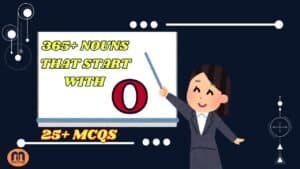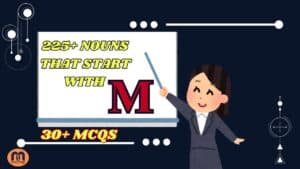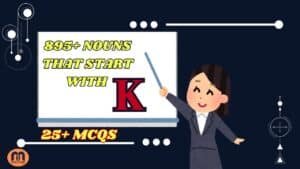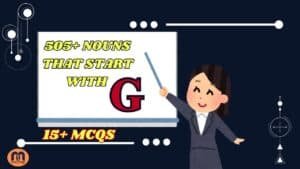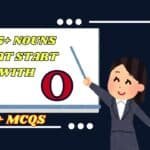Spanish Nouns That Start With CH: Learning Spanish can be an exciting and rewarding journey, but it can also be overwhelming at times, especially when you come across new vocabulary.
One of the most intriguing groups of words in the Spanish language are the nouns that start with “CH.” Not only do they have a unique pronunciation, but they also cover a wide range of concepts, from everyday objects to more abstract ideas.
In this article, we’ll explore the importance of expanding your Spanish vocabulary, dive into a list of over 655+ Spanish nouns that begin with “CH,” and provide you with tips on how to remember and use them in daily conversation.
Why Focus on Nouns That Start with CH?
The letter combination “CH” is quite distinct in Spanish. It’s pronounced like the “ch” in “cheese,” which makes it easier for English speakers to pronounce. But more than just pronunciation, learning nouns that start with “CH” can be incredibly useful for a variety of reasons:
- Common Usage: Many Spanish nouns that start with “CH” are frequently used in daily conversations, making them practical for building your vocabulary.
- Pronunciation Practice: The “CH” sound is an excellent way to practice clear and confident pronunciation in Spanish.
- Cultural Insight: Some nouns with “CH” have specific cultural relevance and can help you better understand Spanish-speaking communities.
Whether you’re starting from scratch or already have a strong foundation, expanding your vocabulary in this way will undoubtedly boost your fluency.
A Comprehensive List of Spanish Nouns Starting with CH
Here’s a breakdown of common Spanish nouns beginning with “CH.” By learning these words, you’ll be able to talk about everything from family members to concepts like time and space!
Everyday Objects and Items
These nouns are perfect for everyday conversations, helping you discuss basic objects and things you encounter in daily life. From clothing to objects around the house, mastering these will make your Spanish more practical and useful.
- Chaqueta – Jacket
- Chaleco – Vest
- Chico – Boy
- Chica – Girl
- Chicle – Chewing gum
- Chorro – Stream
- Chino – Chinese
- Chileno – Chilean (person)
- Chimenea – Fireplace
- Chicote – Whip
- Chorro – Stream
- Chisme – Gossip
- Chamarra – Jacket (Mexico)
- Choclo – Corn (used in Argentina, Peru)
- Chulo – Cool (slang)
- Chorizo – Sausage
- Chicorée – Chicory
- Chasquido – Snap
- Chicle – Gum
- Chaveta – Blade
- Churro – Fried dough pastry
- Chatarra – Scrap metal
- Chiflada – Crazy (feminine)
- Chófer – Driver
- Charco – Puddle
- Chaise – Chair (commonly used in Spanish-speaking countries)
- Chambre – Room
- Chiste – Joke
- Chimichurri – Argentinian sauce
- Chaleco – Vest
- Chubasquero – Raincoat
- Chicle – Gum
- Chorro – Stream of water
- Chinche – Bug (often used for bed bugs)
- Chupar – To suck
- Chal – Shawl
- Chapel – Chapel
- Chisme – Rumor
- Chupete – Pacifier (for babies)
- Chasquido – Snap
- Chiquillo – Boy (child)
- Chocante – Shocking
- Choclo – Corn
- Chihuahua – A breed of dog
Places and Locations
Learning the names of various locations is key to navigating Spanish-speaking countries. These nouns will help you discuss everything from cities and countries to specific types of establishments.
- Chile – Chile (country)
- Chaco – Region (in South America)
- Chiringuito – Beach bar
- Chalet – Cabin
- Chambergo – Traditional hat
- Cholula – A place in Mexico
- Chimbote – A port city in Peru
- Chihuahua – A state in Mexico
- Chaco – A large geographical region (especially in South America)
- Chingón – Badass (informal, used in Mexico)
- Chapultepec – A large park in Mexico City
- Chiclana – A town in Spain
- Chorrillo – A stream or small river
- Chesapeake – A location in the U.S.
- Chauvinismo – Chauvinism
- Chicalote – A place name in Latin America
- Chalmette – A place in the United States
- Churriana – A village in Spain
- Chillán – A city in Chile
- Chapel – Small place of worship
- Chiquinquirá – A city in Colombia
- Chacas – A small town in Peru
- Chase – A location (e.g., Chase Bank)
- Chinguetti – A village in Mauritania
- Chau – Bye (informal, often used in Argentina)
- Chimbo – Slang for a wooden paddle (in some regions)
- Chiclayo – A city in Peru
- Charca – Pond
- Chilapa – A municipality in Mexico
- Chandler – A place name
- Chimaltitán – A place in Mexico
- Chilca – A small town in Peru
Foods and Beverages
Many of the most popular foods and beverages in Spanish-speaking countries begin with “CH.” These words will be especially helpful when you’re ordering food or talking about your favorite dishes.
- Churro – Fried dough pastry
- Chocolate – Chocolate
- Chili – Chili pepper
- Chirimoya – Cherimoya (fruit)
- Chía – Chia (seeds)
- Chop suey – A Chinese dish
- Chicharrón – Pork cracklings
- Chía – Chia (seeds)
- Chimichurri – A condiment from Argentina
- Chorizo – Sausage
- Chocolina – A type of chocolate dessert
- Chía – Chia (seeds)
- Chicha – A fermented beverage
- Chili – Chili (hot pepper)
- Choclo – Corn (in South America)
- Chupito – Shot (of alcohol)
- Champagne – Champagne
- Chateau – Castle (often used for wine)
- Chela – Beer (informal, often in Mexico)
- Chifles – Fried plantains
- Chirimoya – Cherimoya fruit
- Chiles rellenos – Stuffed peppers
- Churros – Fried dough pastries
- Chimichanga – A deep-fried burrito
- Chica – A sweet beverage (in some regions)
- Chontaduro – A type of palm fruit
- Chupe – Stew (commonly used in South America)
- Chocolatito – A small piece of chocolate
- Chilpachole – A spicy seafood stew (in Mexico)
- Chocotejas – A chocolate-filled candy (from Peru)
- Chirimoya – Cherimoya fruit
- Churro – A traditional sweet
- Chavito – A small kid’s drink (sometimes used for soda)
- Chicozapote – Sapodilla fruit
- Chato – A type of glass (for wine)
- Chanfaina – Stew (made of offal, common in Spain)
- Chicha morada – Purple corn beverage (from Peru)
- Chacarera – A type of dance (associated with food festivals)
Abstract Concepts
Understanding abstract concepts is key to expressing opinions, emotions, and philosophical thoughts. These nouns help you discuss ideas, values, and complex concepts in Spanish.
- Chisme – Gossip
- Charla – Chat, conversation
- Chocante – Shock, shocking
- Chavismo – A political ideology
- Chacra – Farm (in South America)
- Chimera – A fantasy, something unattainable
- Chaturanga – A strategic concept (in chess)
- Chaveta – Blade
- Chocarse – To crash, to bump
- Chiflido – Whistle
- Chupón – A suckling (like a pacifier)
- Chorrear – To drip
- Chiste – Joke
- Chavito – A small amount of money
- Chacoteo – Fooling around
- Chilla – A high-pitched cry
- Chismes – Rumors
- Chatarra – Junk, rubbish
- Chido – Cool, awesome (slang in Mexico)
- Chocar – To crash, to collide
- Churrasco – A large steak
- Chiflada – Crazy, deranged
- Chilango – A person from Mexico City
- Chanchullo – A scam or trick
- Chulos – Cool, awesome (slang)
- Chantaje – Blackmail
- Chacal – Scoundrel
- Chafarote – A big mistake
- Chorrito – A small stream
Animals and Nature
In this section, we will explore a variety of animals and natural elements that begin with “CH.” These nouns are useful for anyone looking to enhance their vocabulary related to wildlife, plants, and the natural world.
- Chivo – Goat
- Chita – Cheetah
- Chachalaca – A type of bird (in South America)
- Chango – Monkey
- Chinchilla – Chinchilla (the animal)
- Chacal – Jackal
- Chinche – Bed bug
- Chupacabras – Mythical creature (legendary animal)
- Chirrión – A shrill cry or noise
- Chorlo – A shorebird
- Chupón – Sucker (often referring to a type of insect or animal)
- Chinchón – A type of insect (ant species)
- Chavito – A small fish (often used in the Caribbean)
- Chibé – A drink made from fermented corn (common in South American indigenous cultures)
- Chihuahuense – A dog breed (Chihuahua)
- Chumaceiro – A type of tree from the Amazon
- Charrán – Tern (a type of seabird)
- Chusco – A mixed breed dog
- Chincheta – A type of bug or insect (related to a pest)
- Chicorina – A plant species
- Chiricote – A type of fruit
- Chanchito – Little pig
- Choclo – Corn (South American term)
- Chiquillo – Little boy (in some regions)
- Chacalote – A large fish
- Chivato – A male goat
- Chirrión – A bird species in South America
- Churri – A slang for animal or pet
- Chácaro – Grasshopper
- Chagüí – A species of amphibian
- Chirlo – A bird from the Andes
- Chorreador – A type of squirrel
- Chaco – A geographical region known for wildlife in South America
- Chirimoya – Cherimoya (a tropical fruit)
- Chumbera – Prickly pear cactus
- Chucaro – A term for a wild horse (in Argentina)
- Chirimoyo – A type of fruit tree
- Chañar – A tree found in the Andes
- Choppo – A small fish
- Chiquilín – A playful term for a young boy or animal
- Chica – (in some regions) a term used to refer to a small animal
- Chafalote – A bird species found in wetland areas
- Chingolo – A species of bird (Sparrow)
- Chirrión – A type of insect in South America
- Chacarero – A kind of farmer known in rural areas for raising animals
- Chillón – A type of bird or a loud sound
- Choteo – A colloquial term that can describe a playful or teasing behavior of an animal
Family and Social Life
The following nouns pertain to family, relationships, and social dynamics, which are essential to discuss personal connections and interactions in Spanish-speaking cultures.
- Chacho – Informal term for brother (in some regions)
- Chico – Boy (informally refers to a young man)
- Chica – Girl (informally refers to a young woman)
- Chiquillo – Little boy
- Chiquilla – Little girl
- Chavo – Kid (informal, commonly used in Mexico)
- Chamba – Job (informal)
- Chalán – A worker or assistant (in some regions)
- Chévere – Cool, awesome (slang in many Latin American countries)
- Chicano – Person of Mexican descent (in the United States)
- Chavita – A small child (informal, affectionate term)
- Chulito – Affectionate term for someone sweet (often used for children or pets)
- Chingón – Badass (slang, often used in Mexico)
- Chacha – Housekeeper or maid (informally used)
- Chismoso – Gossiper (someone who spreads rumors)
- Chavales – Kids, young people (informal term used in Spain)
- Churri – Sweetheart, a loved one (informally used in Spain)
- Cholito – A term used for a young boy (in certain regions of Latin America)
- Chulo – Attractive or cool (can refer to a person, used in some regions of Spain)
- Chamá – Slang term for child or kid
- Chato – A term used for someone with a flat nose (affectionately)
- Chamo – Informal term for a boy or man (in Venezuela)
- Chiquitín – Little one (a term of affection for a child)
- Chilango – A person from Mexico City
- Chilindrina – A popular character (often used in reference to kids’ characters)
- Chavea – Young boy or girl (informal in Spain)
- Chocante – Shocking or startling (often used for a person’s behavior)
- Chiflado – Crazy, wild (often used for someone eccentric)
- Chulita – Cute girl (informally used)
- Chiringa – A kite (used informally for kids or playful situations)
- Chabola – Hut or shack (informal for a humble abode)
- Chico guapo – Handsome boy
- Chica bonita – Pretty girl
- Chacho – Brother (used in certain regions of Latin America)
- Chévere – Cool, awesome (common slang in the Caribbean)
- Chiflado – Crazy or eccentric (often used to describe someone’s actions)
- Chaparro – Short person (used affectionately or informally)
- Chaveta – A term used in some areas to refer to a mischievous person
- Chilingo – Little rascal (informally used to describe a child who’s naughty)
- Chorrito – Little squirt (can be used for both children and pets)
- Chacharear – To browse through items (informally used for shopping or flea markets)
- Chespa – Slang term for someone who’s a little lazy or sluggish
- Chuchería – Junk food, or a sweet treat (often used in Mexico for snacks)
- Churro – A traditional fried dough snack, often shared in social gatherings
Everyday Chores and Items
These Spanish nouns relate to everyday objects and items, from clothes to things found around the house. They’re essential for basic daily conversations and navigating your environment in Spanish-speaking countries.
- Chaqueta – Jacket
- Chaleco – Vest
- Chico – Boy
- Chica – Girl
- Chicle – Chewing gum
- Chorro – Stream
- Chino – Chinese
- Chileno – Chilean (person)
- Chimenea – Fireplace
- Chicote – Whip
- Chorro – Stream
- Chisme – Gossip
- Chamarra – Jacket (Mexico)
- Choclo – Corn (used in Argentina, Peru)
- Chulo – Cool (slang)
- Chorizo – Sausage
- Chicorée – Chicory
- Chasquido – Snap
- Chicle – Gum
- Chaveta – Blade
- Churro – Fried dough pastry
- Chatarra – Scrap metal
- Chiflada – Crazy (feminine)
- Chófer – Driver
- Charco – Puddle
- Chaise – Chair (commonly used in Spanish-speaking countries)
- Chambre – Room
- Chiste – Joke
- Chimichurri – Argentinian sauce
- Chaleco – Vest
- Chubasquero – Raincoat
- Chicle – Gum
- Chorro – Stream of water
- Chinche – Bug (often used for bed bugs)
- Chupar – To suck
- Chal – Shawl
- Chapel – Chapel
- Chisme – Rumor
- Chupete – Pacifier (for babies)
- Chasquido – Snap
- Chiquillo – Boy (child)
- Chocante – Shocking
- Choclo – Corn
- Chihuahua – A breed of dog
Places You’ll Love to Visit
These Spanish nouns represent a variety of places you can explore, from cities and regions to special types of establishments. They’re perfect for travelers looking to discuss locations, attractions, or even find new spots to visit.
- Chile – Chile (country)
- Chaco – Region (in South America)
- Chiringuito – Beach bar
- Chalet – Cabin
- Chambergo – Traditional hat
- Cholula – A place in Mexico
- Chimbote – A port city in Peru
- Chihuahua – A state in Mexico
- Chaco – A large geographical region (especially in South America)
- Chingón – Badass (informal, used in Mexico)
- Chapultepec – A large park in Mexico City
- Chiclana – A town in Spain
- Chorrillo – A stream or small river
- Chesapeake – A location in the U.S.
- Chalmette – A place in the United States
- Chingetti – A village in Mauritania
- Chauvinismo – Chauvinism
- Chicalote – A place name in Latin America
- Chilapa – A municipality in Mexico
- Chacas – A small town in Peru
- Chase – A location (e.g., Chase Bank)
- Chimeltitán – A place in Mexico
- Chilca – A small town in Peru
- Chapel – Small place of worship
- Chiquinquirá – A city in Colombia
- Chicas – Girls (general term for females)
- Chalmatte – A location in Louisiana, USA
- Chesca – A city in the USA
- Chabala – A regional term for a place in the Andes
- Chuparosa – A location name (often related to flowers in Mexico)
Tasty Treats and Drinks
Spanish-speaking countries are known for their flavorful dishes and drinks. Here are the most delicious foods and beverages that start with “CH,” perfect for food enthusiasts or travelers keen to try authentic flavors.
- Churro – Fried dough pastry
- Chocolate – Chocolate
- Chili – Chili pepper
- Chirimoya – Cherimoya (fruit)
- Chía – Chia (seeds)
- Chop suey – A Chinese dish
- Chicharrón – Pork cracklings
- Chía – Chia (seeds)
- Chimichurri – A condiment from Argentina
- Chorizo – Sausage
- Chocolina – A type of chocolate dessert
- Chía – Chia (seeds)
- Chicha – A fermented beverage
- Chili – Chili (hot pepper)
- Choclo – Corn (in South America)
- Chupito – Shot (of alcohol)
- Champagne – Champagne
- Chateau – Castle (often used for wine)
- Chela – Beer (informal, often in Mexico)
- Chifles – Fried plantains
- Chirimoya – Cherimoya fruit
- Chiles rellenos – Stuffed peppers
- Churros – Fried dough pastries
- Chimichanga – A deep-fried burrito
- Chica – A sweet beverage (in some regions)
- Chontaduro – A type of palm fruit
- Chupe – Stew (commonly used in South America)
- Chocolatito – A small piece of chocolate
- Chilpachole – A spicy seafood stew (in Mexico)
- Chocotejas – A chocolate-filled candy (from Peru)
- Chirimoya – Cherimoya fruit
- Churro – A traditional sweet
- Chavito – A small kid’s drink (sometimes used for soda)
- Chicozapote – Sapodilla fruit
- Chato – A type of glass (for wine)
- Chanfaina – Stew (made of offal, common in Spain)
- Chicha morada – Purple corn beverage (from Peru)
Charming Creatures in Nature
From wild animals to fascinating natural phenomena, this section covers various creatures and natural elements that start with “CH.” Whether you’re into wildlife or simply curious about nature, these nouns will expand your Spanish vocabulary.
- Chivo – Goat
- Chita – Cheetah
- Chachalaca – A type of bird (in South America)
- Chango – Monkey
- Chinchilla – Chinchilla (the animal)
- Chacal – Jackal
- Chinche – Bed bug
- Chupacabras – Mythical creature (legendary animal)
- Chirrión – A shrill cry or noise
- Chorlo – A shorebird
- Chupón – Sucker (often referring to a type of insect or animal)
- Chinchón – A type of insect (ant species)
- Chavito – A small fish (often used in the Caribbean)
- Chibé – A drink made from fermented corn (common in South American indigenous cultures)
- Chihuahuense – A dog breed (Chihuahua)
- Chumaceiro – A type of tree from the Amazon
- Charrán – Tern (a type of seabird)
- Chusco – A mixed breed dog
- Chincheta – A type of bug or insect (related to a pest)
- Chicorina – A plant species
- Chiricote – A type of fruit
- Chanchito – Little pig
- Choclo – Corn (South American term)
- Chiquillo – Little boy
- Chacalote – A large fish
- Chivato – A male goat
- Chirrión – A bird species in South America
- Churri – A slang for animal or pet
- Chácaro – Grasshopper
- Chagüí – A species of amphibian
- Chirlo – A bird from the Andes
- Chorreador – A type of squirrel
- Chaco – A geographical region known for wildlife in South America
- Chirimoya – Cherimoya (a tropical fruit)
Family, Friends, and Social Vibes
These Spanish nouns represent different aspects of family, relationships, and social dynamics. Whether you’re talking about close family members or social interactions, these words are key to navigating social life in Spanish.
- Chacho – Informal term for brother (in some regions)
- Chico – Boy (informally refers to a young man)
- Chica – Girl (informally refers to a young woman)
- Chiquillo – Little boy
- Chiquilla – Little girl
- Chavo – Kid (informal, commonly used in Mexico)
- Chamba – Job (informal)
- Chalán – A worker or assistant (in some regions)
- Chévere – Cool, awesome (slang in many Latin American countries)
- Chicano – Person of Mexican descent (in the United States)
- Chavita – A small child (informal, affectionate term)
- Chulito – Affectionate term for someone sweet (often used for children or pets)
- Chingón – Badass (slang, often used in Mexico)
- Chacha – Housekeeper or maid (informally used)
- Chismoso – Gossiper (someone who spreads rumors)
- Chavales – Kids, young people (informal term used in Spain)
- Churri – Sweetheart, a loved one (informally used in Spain)
- Cholito – A term used for a young boy (in certain regions of Latin America)
- Chulo – Attractive or cool (can refer to a person, used in some regions of Spain)
- Chamá – Slang term for child or kid
- Chiflado – Crazy, wild (often used for someone eccentric)
- Chulita – Cute girl (informally used)
- Chiringa – A kite (used informally for kids or playful situations)
- Chabola – Hut or shack (informal for a humble abode)
- Chico guapo – Handsome boy
- Chica bonita – Pretty girl
- Chacho – Brother (used in certain regions of Latin America)
- Chévere – Cool, awesome (common slang in the Caribbean)
- Chiflado – Crazy or eccentric (often used to describe someone’s actions)
Abstract Ideas and Concepts
Abstract ideas and concepts represent thoughts, feelings, and philosophical ideas that are often intangible but crucial for understanding language, culture, and society. Learning these nouns is essential for discussing complex or deeper subjects in Spanish.
- Chisme – Gossip
- Chamba – Work, job (informal, used in Mexico)
- Chiflado – Crazy, eccentric
- Cháchara – Chatter, small talk
- Chispa – Spark (can refer to inspiration or energy)
- Charla – Chat, conversation
- Chabacanería – Coarseness, vulgarity
- Chillido – Scream, shriek (can describe loud or emotional noise)
- Chasco – Disappointment, bad luck
- Chorreo – Overflow, a stream (can be used metaphorically for emotions or situations)
- Chicotazo – A slap, sharp hit (can refer to a sudden shock or realization)
- Chiste – Joke, humor
- Chafón – Something of poor quality or bad taste
- Chingada – (A vulgar term that can refer to a bad or frustrating situation)
- Chisme – Rumor (informal gossip)
- Chusma – Rabble, a group of people with low social standing (informally used)
- Chantaje – Blackmail, manipulation
- Chocante – Shocking, annoying
- Chacal – A person who is seen as predatory or opportunistic (can be used in a social context)
- Chancleada – A situation where one is reprimanded, often humorously (relating to discipline or punishment)
- Choteo – Mockery, ridicule
- Chingón – Exceptional, badass (used in Mexican slang to describe a person or thing)
- Chico – Boy (can also imply young or inexperienced in some contexts)
- Chavismo – Ideology of Chavism (related to Venezuelan politics and philosophy)
- Chamanismo – Shamanism (spirituality and religious practices in some cultures)
- Chisporroteo – Crackling (used to describe things that spark or crackle, metaphorically it can refer to a heated situation)
- Chotear – To mock, make fun of
- Chinche – Nuisance, trouble (informally, it refers to a bothersome person or situation)
- Choclo – Corn (symbolic in some cultures for abundance or nourishment)
- Chaman – Shaman (a spiritual healer, often used metaphorically for guiding or leadership)
- Chambonada – Blunder, mistake
- Chuchetada – Insult or verbal slap
- Chandazo – Sudden blow or hit (also metaphorically refers to a sudden, impactful event)
- Chiflada – Madness, insanity (informal use, can describe eccentricity)
- Chinampas – Man-made farming systems (can symbolize creative and adaptive ideas in agriculture)
- Chiquillos – Little kids, often used in an affectionate or dismissive way (can symbolize innocence or immaturity)
- Chirriar – To squeak or make an irritating sound (can be used to describe a frustrating or annoying situation)
- Chingarse – To spoil or ruin something (vulgar expression, often used in the context of loss or failure)
- Chingar – To bother, hurt, or harm (informally used in a negative context)
- Chorreo – Overflow, spillage (can refer metaphorically to emotional outbursts)
- Chachareo – The process of bargaining or dealing (often used metaphorically for negotiation tactics)
- Chiquitín – Little one, small (used affectionately to refer to a child or something small)
- Chingadera – A useless object or situation (informal and often negative term)
- Choco – A clash, especially of ideas or people (used to describe conflict or opposition)
- Chinazo – A sudden setback or difficulty (informal term for problems or complications)
- Chandón – A large sum or load of something (often used metaphorically for an overwhelming amount)
- Chilango – A term used for people from Mexico City, sometimes used with cultural implications or as an identity
- Chacalera – A negative, oppressive atmosphere or situation (used to describe harsh or unfair environments)
- Churro – A delightful or simple success (can refer to something small but surprisingly satisfying)
- Chingón – Cool or impressive (used informally in Mexico to describe someone or something outstanding)
- Chistoso – Funny, humorous (used to describe someone who tells jokes or is amusing)
- Chamaquito – A little child (informal, used affectionately in some Spanish-speaking regions)
- Chafón – Something of poor quality, disappointing
- Chusmear – To gossip or talk behind someone’s back
- Chicotazo – A sudden realization or shock, used metaphorically to describe a quick, impactful experience
- Chavo – A young man (informal, common in some regions)
- Chabón – A dude or guy (informal, common in Argentina)
- Chillón – Someone who complains excessively (used to describe an annoying or demanding person)
- Chico/a guapo/a – Handsome boy/girl (often used for physical attraction or social value)
- Chido – Cool, awesome (informal slang, primarily used in Mexico)
- Chinito – A small or cute person, often used affectionately
- Chacalito – A playful or affectionate nickname for someone who is mischievous or daring
- Chisme – Rumor or gossip (often used for spreading unverified stories)
- Chirriar – To squeak or make a sharp noise (metaphorically refers to something that causes discomfort or alert)
Tips for Mastering Nouns Starting with CH
Learning a list of nouns can feel daunting, but there are strategies to help make the process more manageable and fun. Here are some tips that can assist you in memorizing and incorporating these nouns into your daily Spanish use:
1. Use Flashcards
Create flashcards with the Spanish noun on one side and its meaning (and an image, if possible) on the other. Review them regularly to reinforce your memory.
2. Group Words by Themes
Instead of trying to memorize random nouns, group them by themes. For example, learn all food-related nouns together, followed by animals, and so on. This helps create connections between words, making them easier to recall.
3. Practice Speaking
It’s essential to use these nouns in conversation. Try practicing with a language partner, tutor, or even in front of a mirror. The more you speak, the more confident you’ll become with these new words.
4. Watch Spanish Content
Immerse yourself in Spanish through movies, TV shows, or YouTube videos. Pay attention to how these nouns are used in context, and try repeating them to improve your pronunciation and understanding.
5. Write Regularly
Write short stories, diary entries, or simple sentences using your new nouns. This reinforces their meaning and helps integrate them into your long-term memory.
Putting It All Together: Take Action
Now that you’re familiar with over 655+ Spanish nouns starting with “CH,” and you’ve got some practical strategies for memorizing them, it’s time to put your learning into action.
- Set Daily Goals: Make a habit of learning a few new nouns each day. In a week, you’ll have mastered dozens!
- Engage in Conversations: Look for opportunities to use these words in real conversations. This will reinforce your learning.
- Be Patient: Language learning is a process, so don’t be discouraged if you don’t remember everything right away. With consistent practice, you’ll soon be using these words naturally.
Conclusion: Spanish Nouns That Start With CH
Mastering nouns starting with “CH” is a great way to take your Spanish to the next level. Whether you’re chatting about food, talking about family, or discussing cultural topics, these words will help you express yourself more effectively.
So, what are you waiting for? Start integrating these nouns into your Spanish practice, and watch your vocabulary and confidence grow!
MCQs: Spanish Nouns That Start With CH
1. What does the Spanish noun “Chisme” mean?
a) Joke
b) Gossip
c) Complaint
d) Surprise
Answer: b) Gossip
2. Which of the following words refers to a “crazy” or “eccentric” person?
a) Chafón
b) Chingón
c) Chiflado
d) Chiquillo
Answer: c) Chiflado
3. What is the meaning of the Spanish noun “Cháchara”?
a) Large meal
b) Small talk, chatter
c) Sudden shock
d) Sudden pain
Answer: b) Small talk, chatter
4. The word “Chistoso” in Spanish refers to someone who is:
a) Aggressive
b) Funny, humorous
c) Anxious
d) Rude
Answer: b) Funny, humorous
5. Which of these words represents the idea of a “bad quality or disappointment”?
a) Chingadera
b) Chisme
c) Chavo
d) Chispa
Answer: a) Chingadera
6. The Spanish noun “Chaleco” can best be described as:
a) A jacket
b) A vest
c) A bag
d) A shoe
Answer: b) A vest
7. Which term refers to a “puddle” or “small pool of water”?
a) Chiquillo
b) Chicle
c) Charco
d) Charo
Answer: c) Charco
8. “Chalmatte” in Spanish is a term used for a:
a) Village
b) Event
c) Large boat
d) Location in Louisiana, USA
Answer: d) Location in Louisiana, USA
9. The word “Chavismo” refers to:
a) A musical genre
b) Political ideology related to Venezuela
c) A type of traditional food
d) A dance style
Answer: b) Political ideology related to Venezuela
10. “Chingón” in Spanish is used to describe something or someone that is:
a) Very rude
b) Shocking
c) Exceptional, badass
d) Ordinary
Answer: c) Exceptional, badass
11. “Chiquillo” is a term that refers to:
a) A girl
b) A baby
c) A boy (child)
d) A man
Answer: c) A boy (child)
12. Which of the following words refers to a “large sum or load of something”?
a) Chato
b) Chandón
c) Chachara
d) Cholo
Answer: b) Chandón
13. The Spanish noun “Churro” is:
a) A spicy pepper
b) A sweet pastry
c) A type of bird
d) A serious issue
Answer: b) A sweet pastry
14. What does “Chinche” mean in the context of this article?
a) Joke
b) Bed bug or nuisance
c) Monstrous creature
d) A specific dish
Answer: b) Bed bug or nuisance
15. Which word refers to a “blackmail” or “manipulation”?
a) Chasco
b) Chaveta
c) Chantaje
d) Chisme
Answer: c) Chantaje
16. What does “Chacal” symbolize in the article?
a) A type of food
b) A predator or opportunist (in a social context)
c) A cultural festival
d) A mythical creature
Answer: b) A predator or opportunist (in a social context)
17. “Chaleco” is a Spanish word for:
a) A pair of shoes
b) A vest
c) A type of blanket
d) A bag
Answer: b) A vest
18. Which of these refers to “mockery” or “ridicule”?
a) Choro
b) Choteo
c) Chupón
d) Chamarra
Answer: b) Choteo
19. The term “Chacalera” refers to:
a) A harsh, oppressive situation
b) A small village
c) A bird species
d) A river
Answer: a) A harsh, oppressive situation
20. “Chavales” in Spain refers to:
a) Adults
b) Old people
c) Young people, kids
d) Animals
Answer: c) Young people, kids
Read more knowledgeable blogs on Entry Mags


